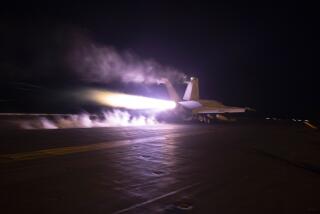F-111s, U.S.-Libya Tension Worry Britons
- Share via
LONDON — The arrival of 18 U.S. Air Force F-111 fighter-bombers, coinciding with reports that the Reagan Administration believes that Libya may mount terrorist actions against Americans, has caused concern here that British bases might be involved again in U.S. raids against Libya.
F-111s taking off from British bases were among the U.S. planes that attacked targets in the Libyan cities of Tripoli and Benghazi last April 15.
Denzil Davies, a member of Parliament representing the opposition Labor Party, said, “We are very anxious about the American reaction to Kadafi.” He referred to Col. Moammar Kadafi, the Libyan leader, and recent reports from the White House that the Administration has gathered evidence that Kadafi is planning terrorist activity involving U.S. targets.
“I’m totally opposed,” Davies said, “to the use of British territory for the Reagan Administration to carry out its bombing escapades.”
Psychological Warfare
Davies described as psychological warfare the U.S.-Egyptian maneuvers in the Mediterranean Sea, which ended Thursday, and the shift of the F-111s to a Ministry of Defense experimental establishment at Boscombe Down, 90 miles west of London.
Earlier this week, David Steel, the Liberal Party leader, urged Prime Minister Margaret Thatcher to reject any U.S. request to use British bases for another attack against Libya.
“In view of the public outcry on the last occasion when the Americans used facilities here to launch their attacks, the British government should make it quite clear that the Americans would not be authorized to use NATO bases in this country for any such strike,” Steel said.
Steel’s remarks came in the wake of reports on the U.S.-Egyptian naval maneuvers and an announcement that Vernon A. Walters, the U.S. ambassador to the United Nations, plans to visit London and other European capitals to discuss the possibility of taking economic measures against Libya.
Obtained British Permission
On his last trip to Europe, Walters won British permission to use Royal Air Force bases to launch 18 F-111s that attacked targets in Libya on April 15.
Britain was the only West European country to support the United States in the April operation, and Thatcher’s decision to allow the use of British bases was criticized by many Britons.
She defended the action as being in Britain’s best interest, but opinion polls indicated that nearly two-thirds of the British public opposed Britain’s involvement. The opposition was based in part on concern that it would expose Britain to retaliatory terrorist attacks.
Two British citizens held captive by a radical Muslim group in Lebanon were executed immediately after the attack and, earlier this month, a British base in Cyprus was hit by mortar and rocket fire in an attack attributed by U.S. intelligence to Libyan and Syrian elements.
No Change in Policy
A British Foreign Office spokesman said Thursday that there has been no change in the government’s policy of refusing to rule out the possibility of another raid, a policy stated shortly after the April attack.
Thatcher, who is on vacation but in London, has issued no statement on the U.S. military movements and has not responded to the comments of her political opponents.
Donald Dick, a spokesman for the U.S. 3rd Air Force in Britain, said 12 of the F-111s that arrived Wednesday night are from the 27th Tactical Fighter Wing based at Cannon Air Force Base, N.M., and the other six from the 366th Tactical Fighter Wing at Mountain Home, Ida. A maintenance support unit of 500 airmen was brought in to service the aircraft, he said.
Dick said the planes will take part in the North Atlantic Treaty Organization’s routine autumn maneuvers and return to the United States on Sept. 24. Word that the movement is routine has done little to dispel the concern of Britons, in part because preparations for the April raids were also described as routine maneuvers.
The 18 F-111s join 150 other F-111s based in Britain with the 3rd Air Force.
More to Read
Sign up for Essential California
The most important California stories and recommendations in your inbox every morning.
You may occasionally receive promotional content from the Los Angeles Times.












